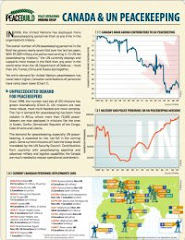The Fourth Committee (Special Political and Decolonization) met on October 27 to continue its general debate on the whole question of peacekeeping operations in all their aspects. In his statement to the Committee, Canada's representative -– on behalf of the CANZ group (Canada, Australia, New Zealand) -– stressed the need for a consensus from member states on robust peacekeeping, the protection of civilians and peacebuilding.
With regards to robust peacekeeping, CANZ's statement underlined that in order to ensure that the mission objectives established by the Security Council can be met, Member States need to come to a shared understanding on the tasks peacekeepers may be expected to perform, and what implications robust peacekeeping may have on operational requirements.
On the issue of the protection of civilians, CANZ reiterated its concerns that military and police personnel tasked to protect civilians do not have appropriate guidance to effectively implement protection mandates. CANZ requested that DPKO, in consultation with the wider UN community, commence developing operational guidelines and training standards, as a matter of priority, to assist mission personnel to effectively implement protection mandates.
On peacebuilding, the CANZ group stated that the development of indicators and benchmarks of progress is required to form the basis of a transition policy that would clarify when and how a peacekeeping mission evolves into a peacebuilding one.
Click here to read the full statement
Thursday, October 29, 2009
Wednesday, October 28, 2009
Course Announcement: The Challenge of Contemporary Peacebuilding
This course examines the nature of cotemporary civil wars and the challenges of stabilization, reconstruction and recovery encountered by modern international peace operations/peacebuilding missions. It will trace the origins and evolution of today’s expansive international interventions to support war to peace transitions in places such as Afghanistan, Liberia, Kosovo and elsewhere. It will feature examination of the diverse and interconnected roles of international civilian and military agencies (the UN and other international organizations, donor states, foreign military forces and coalitions, NGOs, and commercial entities) in promoting humanitarian relief, physical security, development, human rights and, ultimately, sustainable peace. It will present influential social science research; as well, review the evolving “state of the art” amongst practitioners and policy makers.
The Centre for Military and Strategic Studies is offering this Blockweek Course in January 2010 (4-8, 2010).
*This is a graduate level strategic studies course (STST 651.26) at the University of Calgary that is also open to non‐degree professionals working in the fields of aid, peace and security through University of Calgary’s Department of Continuing Education.
Click here for more information.
The Centre for Military and Strategic Studies is offering this Blockweek Course in January 2010 (4-8, 2010).
*This is a graduate level strategic studies course (STST 651.26) at the University of Calgary that is also open to non‐degree professionals working in the fields of aid, peace and security through University of Calgary’s Department of Continuing Education.
Click here for more information.
Tuesday, October 27, 2009
World must help fund, train African Union peacekeeping missions – UN
Read the report on Support for AU peacekeeping which was produced by Security Council Report prior to yesterday's debate at the Security Council on support for AU peacekeeping. The report explores key recent developments, key issues and council dynamics with regard to this issue
Thursday, October 22, 2009
Sudan UN peace mission head assassinated in Islamabad
Suspected Taliban militants shot and killed a Pakistani army brigadier and his driver in the capital on Thursday as the military continued a major offensive against the insurgents in their strongholds near the Afghan border.
'Everyone in the mission is very shocked,' Kouider Zerrouk, UNMIS spokesman told Reuters. UNMIS, one of the world's largest UN peacekeeping missions with around 11,000 personnel, was set up to monitor and support the 2005 peace deal than ended the two-decade civil war between Sudan's north and south.
Militants shot and killed Brigadier Moin-ud-din Ahmed, deputy force commander of the United Nations Mission in Sudan (UNMIS), who was on vacation in Islamabad.
Monday, October 19, 2009
Canadians teach peacekeeping to African troops
Canada is one of the biggest supporters of the Bamako peacekeeping school, contributing more than $2-million for its construction and development since 2007 and sending several Canadian military officers to help with training and management at the school. The Pearson Peacekeeping Centre in Canada is one of the school's main partners.
Read the article
(photo and article: The Globe and Mail)
Read the article
(photo and article: The Globe and Mail)
Saturday, October 10, 2009
Call For Articles To Peacekeeping This Month
The African Peace Support Trainers Association (APSTA) was established in Pretoria, South Africa, in October 2002, as the African Chapter of the International Association of Peacekeeping Training Centres (IAPTC). Among others, the Association aims to provide a forum in which representatives from its members could discuss issues pertaining to their work - peace support training, explore areas of cooperation, and develop strategies on how to contribute to the capacity-building needs of the African Union and its sub-regional organisations.
The Association hosts an online bulletine ‘Peacekeeping This Month’ which offers the platform for members of the Assciation to discuss and debate as well as be informed of current issues pertaining to peacekeeping in general and peacekeeping training in particular.
click here for more
click here for more
Monday, October 5, 2009
Report of Interest: International Police: Improving Professionalism and Responsiveness
Source: Henry L. Stimson Center
Sunday, October 4, 2009
Subscribe to:
Posts (Atom)







